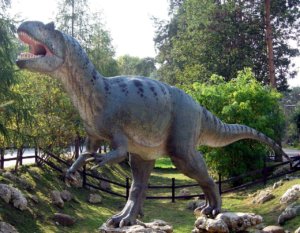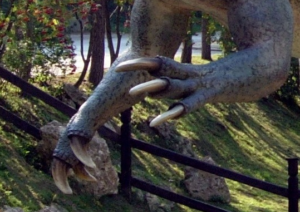
Guy Smith, vice-president of the National Farmers’ Union, said last week that farmers were at risk of being treated as “park keepers”, with Britain forced to increase its reliance on imported food. ‘If the only support mechanism that we get is for environmental delivery, we then become state paid park keepers,” he said. “My concern is where does that leave food?‘.
I quite often hear the ‘park-keeper’ phrase from farmers but it’s entirely inappropriate for the following reasons:
- if British farmers were park keepers they’d be sacked – the State of Nature report showed that ‘the index of change in the abundance and occupancy of farmland species has fallen by 0.56% per year; a statistically significant drop of 20% in total, over the long term. Over our short-term period, the index declined by 0.69% per year; a statistically significant fall of 8% in total.’
- farmers are supposed to get their income from selling stuff we want – not from the state – but if we decide post-Brexit to continue with income support for land owners then those payments should be for public goods, like carbon storage, flood alleviation, unpolluted water and wildlife rather than for being farmers.
- if we want farmers to be park keepers (and this isn’t something that anyone other than farmers ever says) then the farming industry should be asking us for the details of what we want for our money and working out how to deliver it. What other industry tells its customers what they are allowed to have and then demands it is paid for doing what it wants to do?
 Let’s hope that Guy and his fellow dinosaurs find it difficult to pick up a pen or tap on a keyboard with those claws at the end of their short arms, otherwise we might their words embedded in the long-awaited Defra Farming Strategy.
Let’s hope that Guy and his fellow dinosaurs find it difficult to pick up a pen or tap on a keyboard with those claws at the end of their short arms, otherwise we might their words embedded in the long-awaited Defra Farming Strategy.
The post-Brexit future of farming will be a big test of TM the PM, Andrea Leadsom and Defra. Hands up who is feeling confident that they will come up with the goods! What – no-one?
[registration_form]
But farmers themselves want to be park keepers, why else would they keep chuntering on about being the only true guardians of the countryside, and wanting right to roam ever more restricted so people stay on the paths and off the grass, and not to forget the gift shops at the farm store. And the concessions where they sell rides on horses and donkeys and various other bits of “genuine” rural rurality. Certainly sounds like what park keepers do.
Can’t have it all ways, farmers.
In addition to my last. We import mainly stuff that cannot be economically grown here, don’t we? There is nothing wrong with that, and certainly guava, banana, and watermelon sales (items which are available all year round in supermarkets) are not taking any precious hard earned from UK farmers. Even out of season common crops like potatoes are not hurting UK farmers, because they are out of our season.
When farmers argue for total self sufficiency it means they are arguing for a very austere palate of foods. Now I’ve looked at what they ate during the war, and in the even more strained measures immediately afterwards which was even more austere partially because the land was exhausted of nutrients due to the intense farming in the conflict period, and I don’t to go back to that. A wide ranging palate which is economically globally supported and benefits virtually every single nation on the planet, that is what I want. Not rank protectionism and ideologically based austerity to serve that aim. And if that means some UK farmers have to go to the wall due to being uneconomical and unwilling to change and adapt then, while my heart goes out to them because it is never easy making such a life change and the conservative approach to unemployment would make Thomas Cromwell gape in horror, well, so be it. They’ve still got more support that the coal industry, the steel industry, the weaving industry, the shipbuilding industry, the sugar industry, and gods alone knows how many other industries; all of which had to go to the wall in the name of global progress and only exist now in vestigial and near (if not actual) museum piece form. What the actual Freddie Understand Carnal Knowledge makes farmers so special in this regard?
‘s easy…food has a market value for which a farmer gets the market price. Public goods are what are paid for out of ‘support’ i.e. the farmer’s hand in your pocket.
Well all these things are true but if we are going to effect real change we as thenature conservation community need now urgently to reach out to the people within the farming community, the nfu and the clan who do want to change and talk. I don’t think that many really realise the implications of change but there is a growing awareness that partnerships are going to be essential. What does this mean. Their refusal to countenance the illegal killing of birds of prey, the free willed creation of corridor habitats with perhaps limited support for the ecosystem services identified above, the tolerance of beavers, the restoration on a basis of intelligent understanding if white tailed eagles or on a lesser scale from an idealistic perspective but massively significant angle for biomass the recreation of prey guilds – the lost amphibian, water voles and other species that support other life. It can’t all return if it’s a continent or landscape away. New fresh talks need to begin this is not a time for staid recrimination but for exploring – however trying – the opportunities for what might be.
Some slightly ill thought through comments above I feel. Food imports puts the economy at risk from currency fluctuations as had been seen since £/€ revaluation of recent months and the BOE,s warning that interest rate rises may not be far off. Domestic support for agricultural production dampens these effects as can also be seen as currency has devalued by 15% while food prices have been capped at a far lower level by a combination of consumer pressure and domestic supply. Given that nothing scares a government more than food price inflation the 3.5 billion spent on support for U.K. production could be seen as quite cost effective when viewed in relation to GDP. In addition given that farm % share of retail price is sub 9%, an all time low, support could be seen as more realistic. As a fraction of farm output it equates to £25 per ton on say a wheat price of today ex farm of £135 bringing the price up in effect to £160 per tn. Index linked price today based on 1980 values would be £260 circa which illustrates the economic model which agriculture has followed.
It’s also worth pointing out that 60% of UK food is produced by under 0.5% of the Uk’s population compared to 15% in 1900. I would tactfully point out to the author of this blog that the title of “dinosaur” may be more appropriate when used in the context of our diminutive status rather than our skills set
Julian – well the ‘currency fluctuation’ is due to Brexit and wheat is a global market. Post Brexit we can buy wheat at £135/tonne on the world market and spend our £25 on beer and fags or the NHS or Lynx reintroductions.
No, it’s not really worth pointing out that 1900 is different from 2017.
Currency fluctuation? Is that what we are calling cack handed diplomacy by idiots who think alienating people and isolation are signs of strength and virtue? Playing nice with our international partners would solve a lot more problems a lot more cheaply than any amount delusion of self sufficiency and Empire 2.0. Or we could just blow a tonne of cash on redesigning pound coins to look like something from the 1890s.
It’s a good rule of thumb that anything the NFU supports, a decent person concerned with the welfare of small farms, waged agricultural workers and the environment should oppose. Its stance on farm subsidy is, as usual, little more than a smokescreen for enabling its wealthiest stakeholders to yell, “Get Orf My Land, peasants! Oh, and that’ll be a tenner for the barbed wire fencing to keep you out”.
A good report published recently by The Ethical Consumer describes the NFU as “not really national, not really farmers and not really a union”. Instead, it is better understood as an English agribusiness lobby group.
This is why representing its views as those of farmers is both misleading and unhelpful; farmers I know hardly recognise themselves in the positions the NFU takes.
We should be lobbying DEFRA to stop privileging the NFU in the legislative process, and engaging with farmers outside of its auspices when we want to discuss land use policy and practice.
Mark, It’s really not that simple, I wish it was and I’d join you down the pub and spend the excess cash with gay abandon. Take wheat, which was your example, for instance. The UK is usually a net exporter of wheat so in theory we are self sufficient so why last season did we have a sizeable exportable carry over of stocks while we still imported several million tons ? The issue is one of transport costs, availability and access to markets. So take the recent currency devaluation and it’s effect on the U.K. market; pre June last year wheat traded at around £98 as available harvest 16 and today ex farm price is £142 which is if my maths are right almost 40% increase when the currency has only moved now by say 10% overall £/€… If your still with me on this one and not fallen asleep (!) the hidden effect of currency is price rationing so as the currency fell away vast amounts of wheat were exported from eastern ports as we could outcompete other countries in the tender process. It was soon apparent that the markets view of the surplus production was not 800k tons but probably sub 200k tons with over six months to go until new domestic stocks were available.. this drove up the domestic price as the market factored in the new stocks to use ratios magnifieing the price rise by a factor of four times the movement in currency.. ultimately the consumer pays as it’s passed down the line via feed compounders, millers and so on.
Okay that’s just one over simplified example, there are other factors such as $/£ and import tariffs on substitutes such as maize.. I’m not a great expert but obviously I’m responsible for selling quite a bit of grain so I understand the basics but just saying subsidies plus domestic price is more than current imported price is WAY off the mark I’m afraid.